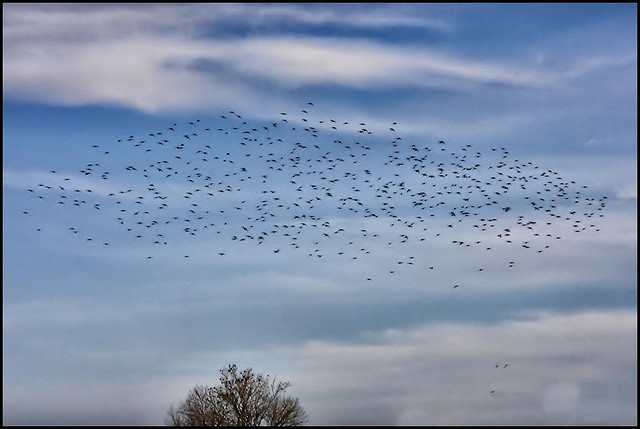 A murder of crows. An exaltation of larks. A business of ferrets. Many of us are familiar with these strange and often fanciful group names for animals, but why do they exist? Birds, particularly, seem an odd case, since English has a perfectly serviceable word (“flock”) that can be used to refer to any group of birds.
A murder of crows. An exaltation of larks. A business of ferrets. Many of us are familiar with these strange and often fanciful group names for animals, but why do they exist? Birds, particularly, seem an odd case, since English has a perfectly serviceable word (“flock”) that can be used to refer to any group of birds.
The word flock actually predates most of these more arcane terms, as it was first attested in the 13th century CE, and is believed to have arisen from the Old English flocc, meaning “a crowd or band,” which in turn likely evolved from the Old Norse flokkr, which carried a similar meaning.
Words like flock, herd, and school are known as collective nouns, or more archaically, as terms of venery. Venery, a Middle English word meaning “to hunt game animals,” likely shares a root with the Latin venus—the goddess of desire, and hence, pursuit.
During the Middle Ages, sport hunting was a popular pastime among the upper classes, and like all hobbies hunting developed a specialized vocabulary, including the terms of venery. Whether these terms arose from a genuine need for specificity or from a desire to sound knowledgeable by creating trivia is not historically clear.
Many of these terms were collected in a late 15th century publication known as The Book of Saint Albans (or The Boke of Seynt Albans, in the days when spelling was subjective). Some of them make perfect sense: anyone who has heard the incessant clicks, whistles, and chirps of a flock of starlings could understand how such gatherings could be called murmurations, and a gathering of carrion-loving crows might well herald a murder.
Others were more obscure or arose from memetic mutation: a siege of bitterns was originally rendered as a sedge of bitterns, likely a reference to the birds’ marshland habitat. Others are complete nonsense to our modern ears, such as a dopping of sheldrakes (or mergansers in America).
In the New World, the tradition of fanciful terms of venery continued as new species were discovered. One of my favorites is the chain of bobolinks.
Which animal-related collective nouns do you like best?
Photo copyright Pat Dalton via flickr


What wonderful terms! Where can one find a complete list?
A giggle of little girls
and
a tornado of little boys
It must be a charm of hummingbirds!
So many to choose from!
–a charm of finches
–a scold of jays
–a wake of buzzards
Just finishing watching “Murder of Crows” from the Nature station…copied some time ago.
I did not know ANY of these words describing “flocks” of birds. And I wanted to be an ornithologist as a kid!
hard to beat a Parliament of Owls
An obstruction of Republicans
A murder of crows, and a bonfire of dragons!
My favorite is a ‘slurp’ of sapsuckers!
Loree Burns
http://loreeburns.wordpress.com/?s=yellow-bellied+sapsucker